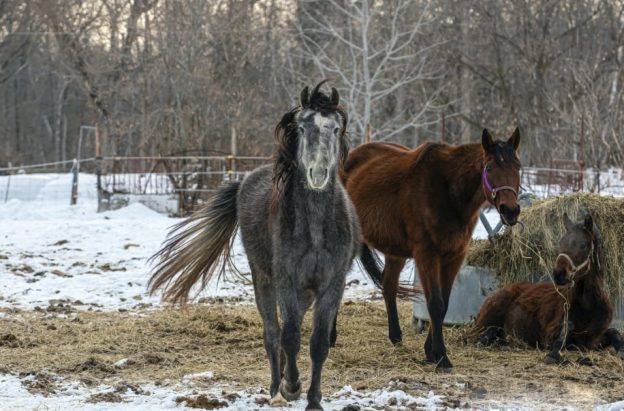Like with every horse, it is critical to make certain that breeding animals are fit and stay in good form. For this to happen, you need to consider the nutritional side of horse feed carefully. If you lack attention to detail here, your chances of having a horse at the ideal health for breeding success diminish. There is much involved in the process. The areas we want to focus on are feeding the mare during pregnancy and feeding her foal.
Starting point
In the first eight months of pregnancy in the maiden or brood mare, the nutritional needs won’t change much. This is in comparison to standard maintenance levels. The reason why is that the goal is to preserve body condition as much as you can. Minimal or no extra nutrition is necessary.
Preferably, mares up to eight months pregnant should get around 10% protein. It is the same for the standard minerals and vitamins that you’d usually use for her maintenance. However, these minerals could be deficient in the diet. Or, they could be massively imbalanced. If so, they can contribute to issues in embryo loss. Feeding the mare properly during her pregnancy has advantageous effects for the rebreed too.
From the eighth month onwards, there is quick foetal growth. Around 60-65% of the foetal weight gets developed during the final 90 days of pregnancy. It is here when the protein, calcium, and energy demands increase. Supplementing protein is a good idea. You should supply a diet of around 15% protein at this time.
Nutrient needs in the final trimester
It is critical to meet the nutrient needs during the final trimester of pregnancy. This is for the benefit of both the unborn foal and mare. Should you fail to do it, lactation can be influenced. The foal can experience a reduction in birth weight. So, make sure you choose the right horse feed.
It is also preferable not to include high starch percentages in the mare’s feed ration whilst pregnant. Too much can contribute towards unborn foals possessing weakened skeletal structures.
The mare is capable of producing as much as 3% of her bodyweight in milk. It is rich in energy. This can change between mares depending on their natural capacity to produce milk. Also, it is influenced by energy intake from food and water availability.
Necessary feed intakes increase from the stage of initial colostrum production to the end of the initial three months of lactation. Furthermore, there is a bigger demand for protein during this time. Other important nutrients in lactation include phosphorous and calcium. A deficiency can lead to reduced milk output.
The foal
For the foal, they need to receive the proper amount of nutrition and energy. An imbalance can lead to issues that can affect it for the remainder of its life. The right horse feed is essential to avoid this.
One essential thing to ensure is that foals gain the mother’s colostrum within the initial 8-12 hours of being born. This holds critical antibodies that protect them from infectious diseases.
The mother’s milk will be the leading source of energy and nutrients for the next three months. Within that time though, the foal will begin exploring other feed options.
It is not until the mare’s milk supply starts dropping off after three to four months that the foal will need an alternative feed other than decent grass. Said horse feed must give the foal a proper balance of minerals, nutrients, vitamins, and energy. It will ensure a steady growth rate and a good supply of everything they need.
At six months, the foal tends to get weaned. This can cause a few complications with dieting. Most importantly it can cause stress in regards to handling separation from the mother. That can affect appetite. Feed management needs to stay constant here because any changes can add stress to the weaning.
Too much energy through starch
It is crucial to guarantee that from birth to weaning, and then into the first year, the foal isn’t getting too much energy via starch. Oversupply of energy and carbohydrates in diets can cause growth disturbances. The danger of these developing normally decreases after a year of age.
Throughout feeding it is essential that the young stock has access to high quality forage. You must supply concentrate feed in relation to the quality of pasture. Check the condition regularly to inspect growth rate. Avoid high starch levels. Also, keep the balance of minerals and vitamins in accordance to the horse’s type and breed.
Shop with us for horse feed
At JS Hubbuck Ltd, we have plenty of feed available for purchase. Even better, we offer our merchandise for very competitive rates. So, if you find yourself in need of any, you can rely on us. Get in touch if we can be of any help to you.

